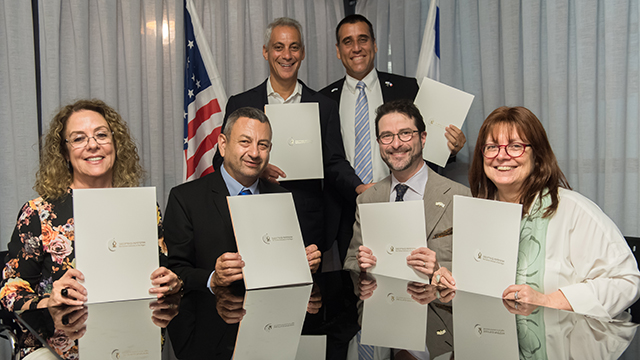EVANSTON - Northwestern University engineers and social scientists, playing a leading role in seeking solutions to a global crisis over water insecurity, visited Israel this week to deepen academic exchanges, create new partnerships and collaborate with Chicago officials who are also working on the problem.
Members of the Northwestern community are in Israel participating in WATEC, a major international water industry conference, as part of a delegation with the city of Chicago.
Yesterday, Aaron Packman, director of the Northwestern Center for Water Research, and Fruma Yehiely, associate vice president for research at Northwestern, signed a memorandum of understanding (MOU) with Ben-Gurion University’s Zuckerberg Institute for Water Research in Israel. The MOU seeks to facilitate the exchange of students, faculty and postdoctoral fellows.
Chicago Mayor Rahm Emanuel also attended and gave opening remarks at the WATEC conference in addition to witnessing the signing of the MOU.
Emanuel’s trip to Israel is aimed at promoting investment and innovation in Chicago. From Sept. 9 to 13, the mayor is traveling with a delegation composed of academic and business leaders from across the Chicago area.
A key focus of the trip is to highlight Chicago’s leading role in advancing water technology innovation and conservation through Current while showcasing new collaborations leveraging Israeli water expertise.
Current is a Chicago-based nonprofit bringing together an array of industrial and research institutions to advance innovation in water technology. Northwestern University is a founding member of Current.
Packman is working with collaborators in Israel to improve water supply and safe water reuse in arid lands. One approach is to capture water from the atmosphere. Packman said it could be dew, fog or water vapor, as per research underway by Neelesh Patankar and Kyoo Chul Park.
“We have two specific targets,” said Packman who is also a professor of civil and environmental engineering at Northwestern University’s McCormick School of Engineering. “One is capturing water in remote areas for agriculture, and the second is water recapture from desalination plants.”
Another set of projects examines the risks of emerging contaminants, including pharmaceuticals. “This is crucial if you’re relying on water reuse,” Packman said.
Israel has large-scale water reuse for agriculture, according to Packman.
“Northwestern has a rich history of engaging with academic institutions in Israel, especially in the fields of engineering and chemistry. From exchanges with the Weizmann Institute of Science and Tel Aviv University to hosting many Israeli researchers, this sustained relationship has mutually benefitted our academic communities,” says Dévora Grynspan, vice president for International Relations at Northwestern University.
Water research is already underway by Northwestern researchers and their counterparts at Ben-Gurion University.
Trapping moisture
Neelesh Patankar, professor of mechanical engineering at the McCormick School of Engineering, is collaborating with Northwestern colleague Kyoo Chul Park and Naftali Lazarovitch from Ben-Gurion University.
“What we hope to achieve is to answer the following question: Is it possible to design optimal mesh or nets that allow rain water to pass through in one direction but prevents water vapor transport through in the other direction?” Patankar said.
“In arid regions like Israel, water evaporation directly from soil is about 40 percent of the water budget in agriculture,” Patankar said. “To minimize this loss of precious water from the soil, conventional technology is to cover the soil with an impermeable material that traps moisture in the soil but doing so also prevents rain and dew from passing through to the soil. To solve this dilemma, we propose these novel moisture-valving nets.”
A more holistic approach
Sera L. Young, assistant professor of anthropology and global health at Northwestern, is working with researchers from Ben-Gurion and National Taiwan University on developing a scale that measures the full human experience with water.
“Although we have measurements of water availability at the national and county levels, we don’t have a scale that captures the human experiences of acquiring, using and going without water at the household level.
“By developing a scale to measure household experiences with water insecurity, we can assess the problem at its core. This helps inform policy. Moreover, we can use this scale to see if the technology is working. It can direct where technology could go and evaluate the impact of already-implemented technology,” Young said.
War and peace, and technology
Water scarcity in the Middle East represents a major cause for state instability and failure, according to Elie Rekhess, the Crown Visiting Professor in Israel Studies at Northwestern and the associate director for Israel Studies of the Crown Family Center for Jewish and Israel Studies.
“Technological solutions can provide facilities for modern irrigation, desalinization, water treatment and water recycling, thus providing larger quantities of both fresh drinking water and water for agricultural use, thus alleviating the humanitarian crises,” said Rekhess, also a member of the Chicago delegation.
“Israel is the region’s leader in water management technologies. Water treaties forged in the mid-1990s between Israel and Jordan and between Israel and the Palestinian Authority have produced significant cooperation between entities historically hostile toward one another,” Rekhess said.


